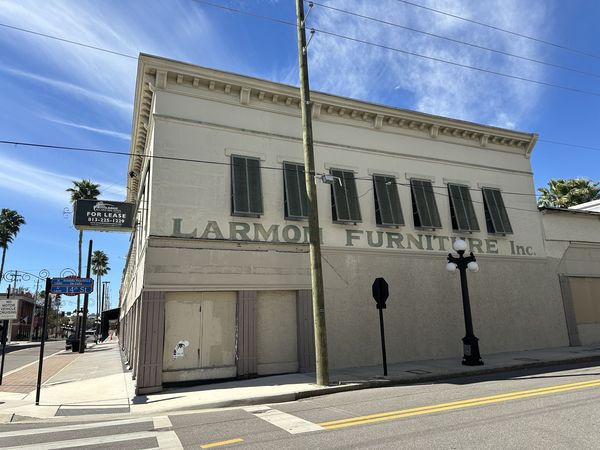Nestled in the historic heart of Ybor City, the Larmon Furniture building once occupied a site steeped in cultural significance. This location was formerly the home of El Liceo Cubano, Tampa’s premier Cuban club in the late 1800s, and a venue for pivotal speeches by the Cuban revolutionary José Martí. Against this rich historical backdrop, Larmon Furniture was established, destined to become a beloved community fixture.
A Storied Beginning
In 1931, Rubel Larmon opened Larmon Furniture in Ybor City, quickly gaining a reputation for its commitment to the community. Rubel Larmon envisioned a store that embodied inclusivity and accessibility, where quality furniture was available to all, regardless of their financial situation. The store’s no-credit-check financing policy was a testament to this commitment, ensuring that even those overlooked by traditional retailers could furnish their homes with dignity.
A Family Legacy of Service
The stewardship of Larmon Furniture passed to Rubel’s son, Curtis, in 1966. Under his leadership, the store continued to thrive, becoming a symbol of warmth and community spirit. Curtis upheld his father’s ethos, ensuring that every customer felt valued and welcomed. This dedication to personalized service and community engagement solidified Larmon Furniture’s reputation as more than just a store—it was a cornerstone of the Ybor City community.
Transition and Continuity
In 1992, the legacy of care and commitment was continued by Rubel’s granddaughter Elizabeth Kalamaras and her husband, Jimmy. They nurtured the store’s relationship with its customers and the broader community, ensuring that Larmon Furniture remained a steadfast presence in Ybor City. Even as the retail landscape changed, the store maintained its values of inclusivity and community engagement. As of 2012, they split their time between the original Ybor City store and a second location in Town ‘N Country.
The End of an Era
On December 13, 2013, it was announced that after 82 years in Ybor City, Larmon Furniture was selling off its inventory, closing its Seventh Avenue location, and reopening the following month in partnership with Happy’s Home Centers, a relatively new appliances, electronics, and furniture business. Jimmy Kalamaras, who had bought Larmon’s in 1992 with his wife, Elizabeth Larmon Kalamaras, granddaughter of founder Rubel Larmon, expressed optimism about the merger, stating, “Our old, established family business is merging with a good company and a great family.”

A Vacant Legacy
Despite the merger, the Larmon Furniture building on Seventh Avenue has remained vacant since 2013. In 2016, the building was acquired by the Accardi brothers, owners of 717 Parking, for $1.375 million. However, the building has remained unoccupied for over a decade, transforming from a beloved community fixture into an urban eyesore. The once-bustling site, which played a crucial role in Ybor City’s cultural and social fabric, now stands as a stark reminder of neglect and decay.
From Cherished Memory to Eyesore
The story of Larmon Furniture is not just about a business; it’s a narrative of resilience, family, and community spirit. However, the prolonged vacancy of the building has overshadowed this legacy. What was once a symbol of warmth and community engagement now blights the landscape, its deteriorating facade a daily reminder of what the community has lost.
Conclusion
The Larmon Furniture building once stood as a monument to Ybor City’s rich history and community spirit. Today, its long-term vacancy has turned it into an eyesore, detracting from the vibrant cultural tapestry of the area. As Tampa evolves, the hope remains that this historic site will one day be revitalized, restoring its place as a cherished part of the community rather than a symbol of urban decay.


